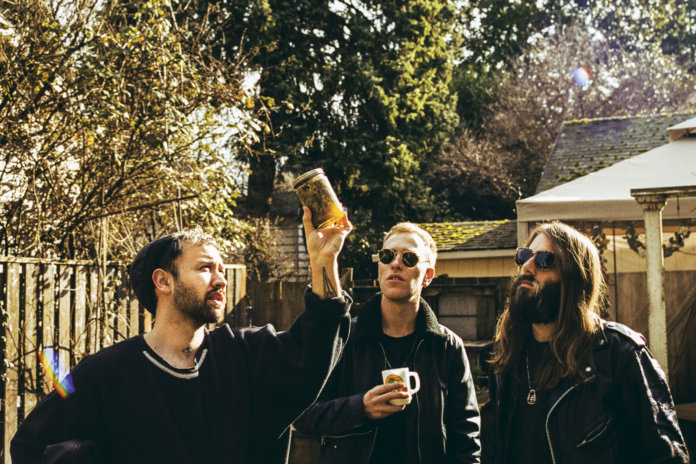Psychedelia is typically characterised as an inward journey. Over the course of two albums with Unknown Mortal Orchestra, Ruban Nielson seemed to be following the prescribed route, with 2013’s slow-burner II defined by pensive, quasi-baroque guitar figures and woozy pleas for solitude. “I’d hide til the end of time… asleep and constantly floating away,” he daydreamed on standout track “Swim And Sleep (Like A Shark)”, sounding very much like a man content to while away his hours in the company of his own thoughts.
In both style and subject matter, the album felt like a companion piece to Tame Impala’s Lonerism, released a few month’s previously. Like Tame Impala’s Kevin Parker, Ruban Nielson plays almost everything on Unknown Mortal Orchestra records himself, the band only convening for live performances. And Nielson is originally from New Zealand, which made it easy for commentators to lump them in with the Antipodean psych revival. But Multi-Love finds Unknown Mortal Orchestra surging ahead of their fellow psych-pop voyagers, abandoning the hazy introversion of previous albums for frisky, rainbow-coloured optimism.
The album opens with a moody harpsichord motif – so far, so psych – but as soon as Nielson opens his mouth it’s clear he’s upped his game. There’s a whole new bluesy contour to his reedy falsetto, redolent of new-school R&B crooners like Miguel and The Weeknd. “Multi-love’s got me on my knees,” he testifies, a giddy submission to love’s three-pronged assault on head, heart and groin. “It’s not that this song’s about her / Most songs are about her.”
“Like Acid Rain” is even more of a revelation, a frenetic two-minute whirl of funky powerpop by way of “Alphabet Street”. By the third song, Nielson’s channelling Stevie Wonder and singing about sex in cars. For a man who’d previously expressed a desire to spend the rest of his life at the bottom of the sea to escape the burden of human interaction, it’s quite a transformation.
Nielson has evidently been listening to a lot of Sly & The Family Stone, but his interpretation of psychedelic soul is pleasingly broad: “Necessary Evil” – featuring a winning trumpet hook courtesy of his dad Chris – evokes Shuggie Otis while “The World Is Crowded” is an impressive stab at the kind of lush, weird neo-soul peddled by Bilal and D’Angelo. “Can’t Keep Checking My Phone” even works up a wonky psychedelic disco groove not unlike Caribou’s “Odessa”.
To be fair, there were harbingers of this new direction in the rubbery funk basslines and brisk rhythms that kept II zipping along nicely, even in its most solipsistic moments. Again, Nielson employs the distinctive technique of splicing and looping his live drums so they sometimes sound more like sampled beats, in tribute to the 90s breakbeat records that provided his gateway into soul music.
Combined with his idiosyncratic, lo-fi recording techniques – drums incredibly dry and present, everything else a little bit glazed – you’re unlikely to confuse Multi-Love with an actual R&B record. Perhaps the best comparison is with Beck’s funk fantasia Midnite Vultures, although Nielson’s songs retain a dreamy otherness that wards off accusations of pastiche. There’s even evidence of an emerging social conscience, judging by his game attempt to float the idea of failing relationship as political metaphor on “Extreme Wealth And Casual Cruelty”.
Containing only nine lithe and varied songs, Multi-Love is anything but a whimsical indulgence. In a climate where the tag “psychedelic” is applied to any band of mop-haired chancers with a delay pedal, Nielson has attached the rockets and blasted off somewhere new – acknowledgement that the true psychedelic voyage is not inward but onward ever onward.
Q&A
Ruban Nielson
Your last album was quite introspective, whereas this one’s almost the opposite. What changed?
I didn’t realise how sad the last record was until it was finished and I noticed that I’d used the word “lonely” three times. I didn’t want this one to come from the same place emotionally, I wanted it to to be a happy album. So I took a year off and I used my advance to buy time at home. That had a huge effect on me, to be off the road after three years of touring. A lot of it was just spending time with my family, especially my kids because they’re so funny and keep me from getting too cynical.
Your dad and your brother are on the album too, so it’s a real family affair…
It’s part of the whole idea of trying to make a happy record. I played with my brother Kody in my old band The Mint Chicks and we ended up not getting along so well because the band put a lot of pressure on our relationship. But I really missed him, so I flew him out to Portland so we could just hang out and make music again. My dad comes from a jazz background and this record is the first thing I’ve ever done that’s genuinely impressed him. I sent him “Necessary Evil” and he said, ‘I’m hearing some horn parts!’ So I suggested he record what he was hearing and it was just perfect.
What does the phrase Multi-Love mean to you?
Well, how many forms of love do we have? Obviously not enough. We’re always figuring out new futuristic ways to hate people but not really equalling that with any kind of movement in the other direction.
INTERVIEW: SAM RICHARDS



